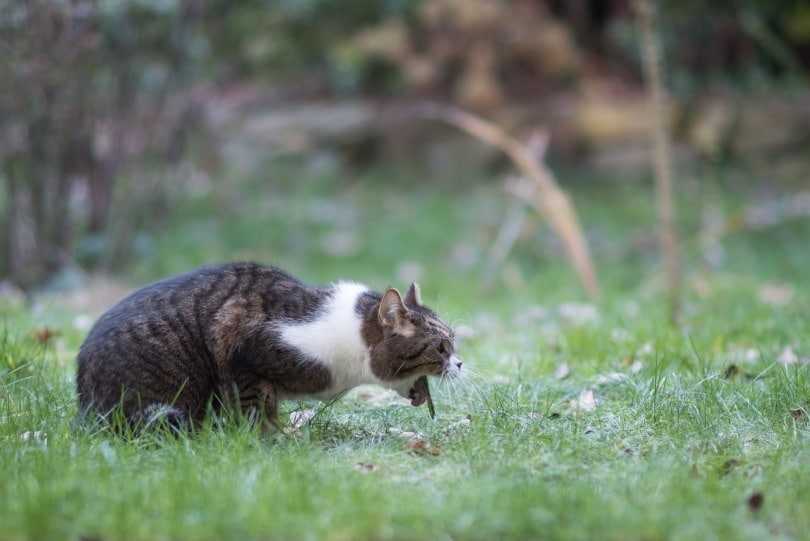It’s not a secret that bacon isn’t a particularly healthy food. We often think of bacon as a cut of meat not dissimilar to a steak or pork chop, but it’s not. Bacon is heavily processed, as it goes through several stages like curing, smoking, and salting before it winds up in the grocery store. It’s chock full of nitrates and saturated fat, and the World Health Organization (WHO) classified it as a carcinogen in 2015. This means there is sufficient evidence to suggest that bacon contains agents that can cause cancer.
So, while it’s okay for humans to eat a slice of bacon in moderation, is it okay for us to feed it to our cats? The answer is yes, but with a caveat. Keep reading to learn more about when it’s okay to offer bacon to your feline family members.
Can Cats Eat Bacon?
Your cat is a carnivore, so it’s only natural that they’d be pawing at your breakfast plate when you’re chowing down on bacon. So, is it okay to offer your kitty a taste of your salty, crunchy, and delicious bacon?
The general verdict is that yes, your cat can eat bacon. That said, however, bacon needs to remain an occasional treat and not something they get every day. A small piece of bacon won’t hurt your cat, though it might awaken the bacon-loving fiend inside of them.
If you must offer them a piece of bacon, tear off a tiny piece of a slice that has been fully cooked. We don’t recommend going bigger than the eraser on a pencil. This amount will provide them with a tasty snack without any of the harmful side effects of larger quantities.

Are There Any Concerns with Cats Eating Bacon?
Yes, there are concerns with cats eating bacon. In fact, the same concerns exist regarding humans eating bacon.
Bacon is very high in salt. According to the U.S. Department of Agriculture, one slice contains a whopping 115 milligrams of sodium.
- Excessive thirst
- Reduced appetite
- Weakness
- Seizures
- Lethargy
It’s unlikely your cat will experience any of these signs from a bite or two of bacon every so often. However, it’s important to include them here to showcase how dangerous too much bacon can be. If you make bacon a part of your cat’s regular diet, they could develop high blood pressure, obesity, and even salt poisoning.
Bacon is also very high in fat. Just as in human diets, fats, especially the saturated kind in bacon, are wildly unhealthy. This high-fat content can cause digestive stress in your cat’s tiny body.
- Softer stools
- Diarrhea
- Vomiting
- Indigestion
We don’t recommend offering bacon to kittens, as their sensitive digestive systems are not yet equipped to handle the sodium and fat content.

Can I Feed My Cat Raw Bacon?
Your cat’s ancestors chowed down on a diet of raw meat, so it must be okay to offer your modern domestic cat raw meat, right?
The answer is a resounding no. You should never offer your cat raw pork meat. Uncooked pork meat can contain parasites and even be toxic to your pets. Your cat may contract trichinellosis, a rare but very serious parasitic disease from eating raw meat.
What About Turkey Bacon?
Humans often grab a package of turkey bacon in the grocery store if they’re trying to watch their weight. It’s lower in calories and fat than traditional bacon, so it must be healthier for our cats (and us) to eat, right?
The truth is that turkey bacon isn’t that far off from pork bacon. It is still full of sodium and fat which can put your cat at risk of obesity if they’re offered it too often. If you want to give your kitty a bacon-like treat, turkey bacon isn’t healthier than its pork counterpart.

Is It Okay to Offer Bacon Grease?
The thought of lapping at bacon grease would make even the most diehard bacon-loving human sick to their stomach. Cats may not view it the same, however. Bacon grease can be just as tempting to your cat as the slice of bacon itself.
In fact, some pet owners even pour bacon grease on top of their pet’s dry food to make it more appetizing. We do not recommend this route at all due to the high sodium and saturated fat content of the grease.
Conclusion
Bacon is a tasty treat for both humans and cats. It should remain just that—a treat—for cats, though. A piece of a slice of bacon on occasion isn’t going to hurt your cat, but it doesn’t provide any nutritional benefits for them, either.
It’s best to offer your cat a healthier treat, one that provides more nutritional bang for their buck. Plus, you then get to keep all the bacon to yourself. It’s a win-win for you, really!
Featured Image Credit: Piqsels












